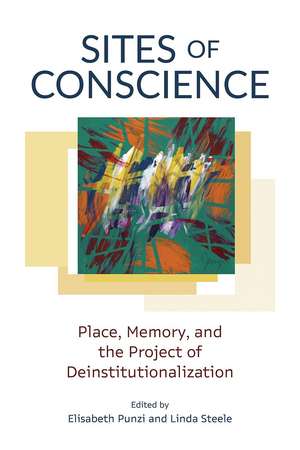Sites of Conscience: Place, Memory, and the Project of Deinstitutionalization: Disability Culture and Politics
Editat de Elisabeth Punzi, Linda Steeleen Limba Engleză Paperback – 4 oct 2024
Into the twenty-first century, millions of disabled people and people experiencing mental distress were segregated from the rest of society and confined to residential institutions. Deinstitutionalization—the closure of these sites and integration of former residents into the community—has become increasingly commonplace. But this project is unfinished. Elizabeth Punzi’s powerful work explores the use of the concept of sites of conscience, which involves place-based memory activities such as walking tours, survivor-authored social histories, and performances and artistic works in or generated from sites of systemic suffering and injustice. These activities offer new ways to move forward from the unfinished deinstitutionalization project and its failures.
Covering diverse national contexts, Sites of Conscience proposes that acknowledging former residents’ memories and lived experiences—and keeping institutions’ histories and social heritage alive rather than simply closing sites—holds the greatest potential for recognition, accountability, and action.
| Toate formatele și edițiile | Preț | Express |
|---|---|---|
| Paperback (1) | 259.95 lei 3-5 săpt. | +27.17 lei 4-10 zile |
| University of British Columbia Press – 4 oct 2024 | 259.95 lei 3-5 săpt. | +27.17 lei 4-10 zile |
| Hardback (1) | 643.80 lei 3-5 săpt. | |
| University of British Columbia Press – 17 apr 2024 | 643.80 lei 3-5 săpt. |
Preț: 259.95 lei
Nou
Puncte Express: 390
Preț estimativ în valută:
49.75€ • 51.27$ • 42.00£
49.75€ • 51.27$ • 42.00£
Carte disponibilă
Livrare economică 10-24 februarie
Livrare express 24-30 ianuarie pentru 37.16 lei
Preluare comenzi: 021 569.72.76
Specificații
ISBN-13: 9780774869331
ISBN-10: 077486933X
Pagini: 360
Ilustrații: 16 halftones
Dimensiuni: 152 x 229 x 22 mm
Greutate: 0.5 kg
Editura: University of British Columbia Press
Colecția University of British Columbia Press
Seria Disability Culture and Politics
ISBN-10: 077486933X
Pagini: 360
Ilustrații: 16 halftones
Dimensiuni: 152 x 229 x 22 mm
Greutate: 0.5 kg
Editura: University of British Columbia Press
Colecția University of British Columbia Press
Seria Disability Culture and Politics
Notă biografică
Elisabeth Punzi is a clinical psychologist and an associate professor in the Department of Social Work and the Center for Critical Heritage Studies at Gothenburg University, Sweden. Linda Steele is an associate professor in the Faculty of Law at the University of Technology in Sydney, Australia. She is the author of Disability, Criminal Justice, and Law.
Cuprins
Introduction: Sites of Conscience and the Unfinished Project of Deinstitutionalization / Linda Steele and Elisabeth Punzi
Part 1: Centring Survivor Voices and Experiences in the “Afterlives” of Disability and Psychiatric Institutions
1 Historical Memory, Anti-psychiatry, and Mad People’s History / Geoffrey Reaume
2 Contested Memorialization: Filling the “Empty Space” of the T4 Murders / Elena Demke
3 Names on Frosted Glass: From Fetishizing Perpetrator Mindsets to Disability Memorialization of the Victims / David T. Mitchell and Sharon L. Snyder
4 Truth, Reconciliation, and Disability Institutionalization in Massachusetts / An interview with Alex Green
5 “I’m Not Really Here”: Searching for Traces of Institutional Survivors in Their Records / Jen Rinaldi and Kate Rossiter
6 Listening to Peat Island: Planning, Press Coverage, and Deinstitutional Violence at a Potential Site of Conscience / Justine Lloyd and Nicole Matthews
7 “The Old Concept of Asylum Has a Valid Place”: Patient Experiences of Mental Hospitals as Therapeutic / Verusca Calabria and Rob Ellis
Part 2: Learning from Sites-of-Conscience Practices
8 Benevolent Asylum: Performance Art, Memory, and Decommissioned Psychiatric Institutions / A conversation with Bec Dean, Lily Hibberd, and Wart
9 Constructing History in the Post-institutional Era: Disability Theatre as a Site of Critique / Niklas Altermark and Matilda Svensson Chowdhury
10 The Workhouse and Infirmary Southwell: Collaboration with Learning-Disabled Neighbours and Partners / An interview with Janet Overfield-Shaw
11 Intellectual Disability in South Africa: Affirmative Stories and Photographs from the Grahamstown Lunatic Asylum, 1890–1920 / Rory du Plessis
12 Pathways to Disrupt Eugenics in High
Part 1: Centring Survivor Voices and Experiences in the “Afterlives” of Disability and Psychiatric Institutions
1 Historical Memory, Anti-psychiatry, and Mad People’s History / Geoffrey Reaume
2 Contested Memorialization: Filling the “Empty Space” of the T4 Murders / Elena Demke
3 Names on Frosted Glass: From Fetishizing Perpetrator Mindsets to Disability Memorialization of the Victims / David T. Mitchell and Sharon L. Snyder
4 Truth, Reconciliation, and Disability Institutionalization in Massachusetts / An interview with Alex Green
5 “I’m Not Really Here”: Searching for Traces of Institutional Survivors in Their Records / Jen Rinaldi and Kate Rossiter
6 Listening to Peat Island: Planning, Press Coverage, and Deinstitutional Violence at a Potential Site of Conscience / Justine Lloyd and Nicole Matthews
7 “The Old Concept of Asylum Has a Valid Place”: Patient Experiences of Mental Hospitals as Therapeutic / Verusca Calabria and Rob Ellis
Part 2: Learning from Sites-of-Conscience Practices
8 Benevolent Asylum: Performance Art, Memory, and Decommissioned Psychiatric Institutions / A conversation with Bec Dean, Lily Hibberd, and Wart
9 Constructing History in the Post-institutional Era: Disability Theatre as a Site of Critique / Niklas Altermark and Matilda Svensson Chowdhury
10 The Workhouse and Infirmary Southwell: Collaboration with Learning-Disabled Neighbours and Partners / An interview with Janet Overfield-Shaw
11 Intellectual Disability in South Africa: Affirmative Stories and Photographs from the Grahamstown Lunatic Asylum, 1890–1920 / Rory du Plessis
12 Pathways to Disrupt Eugenics in High
Recenzii
"In this pathbreaking book, Punzi and Steele bring together a diverse set of leading scholars and activists to engage theoretically and practically with the creation of sites of conscience related to disability and institutionalization."
"This ambitious collection extends the boundaries of sites of conscience. Engaging with memory and place-based research, the contributors explore activism, agency, and identity to reimagine disability and Mad histories and futures."





